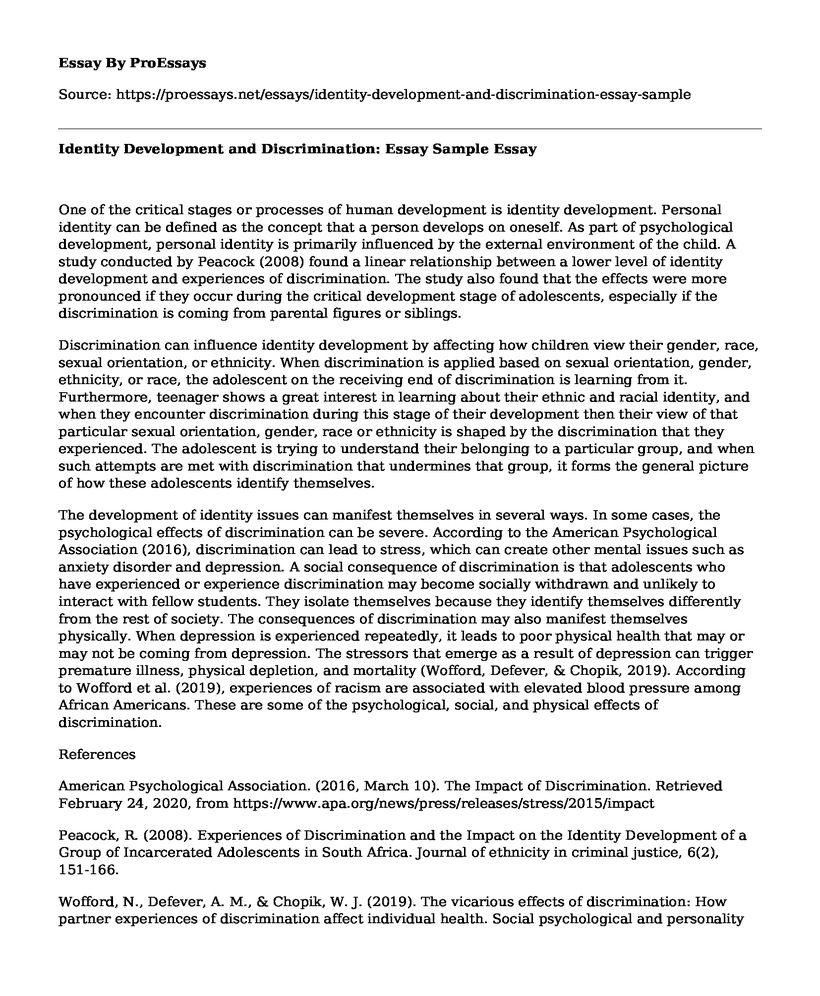One of the critical stages or processes of human development is identity development. Personal identity can be defined as the concept that a person develops on oneself. As part of psychological development, personal identity is primarily influenced by the external environment of the child. A study conducted by Peacock (2008) found a linear relationship between a lower level of identity development and experiences of discrimination. The study also found that the effects were more pronounced if they occur during the critical development stage of adolescents, especially if the discrimination is coming from parental figures or siblings.
Discrimination can influence identity development by affecting how children view their gender, race, sexual orientation, or ethnicity. When discrimination is applied based on sexual orientation, gender, ethnicity, or race, the adolescent on the receiving end of discrimination is learning from it. Furthermore, teenager shows a great interest in learning about their ethnic and racial identity, and when they encounter discrimination during this stage of their development then their view of that particular sexual orientation, gender, race or ethnicity is shaped by the discrimination that they experienced. The adolescent is trying to understand their belonging to a particular group, and when such attempts are met with discrimination that undermines that group, it forms the general picture of how these adolescents identify themselves.
The development of identity issues can manifest themselves in several ways. In some cases, the psychological effects of discrimination can be severe. According to the American Psychological Association (2016), discrimination can lead to stress, which can create other mental issues such as anxiety disorder and depression. A social consequence of discrimination is that adolescents who have experienced or experience discrimination may become socially withdrawn and unlikely to interact with fellow students. They isolate themselves because they identify themselves differently from the rest of society. The consequences of discrimination may also manifest themselves physically. When depression is experienced repeatedly, it leads to poor physical health that may or may not be coming from depression. The stressors that emerge as a result of depression can trigger premature illness, physical depletion, and mortality (Wofford, Defever, & Chopik, 2019). According to Wofford et al. (2019), experiences of racism are associated with elevated blood pressure among African Americans. These are some of the psychological, social, and physical effects of discrimination.
References
American Psychological Association. (2016, March 10). The Impact of Discrimination. Retrieved February 24, 2020, from https://www.apa.org/news/press/releases/stress/2015/impact
Peacock, R. (2008). Experiences of Discrimination and the Impact on the Identity Development of a Group of Incarcerated Adolescents in South Africa. Journal of ethnicity in criminal justice, 6(2), 151-166.
Wofford, N., Defever, A. M., & Chopik, W. J. (2019). The vicarious effects of discrimination: How partner experiences of discrimination affect individual health. Social psychological and personality science, 10(1), 121-130. https://doi.org/10.1177/1948550617746218
Cite this page
Identity Development and Discrimination: Essay Sample. (2023, Apr 10). Retrieved from https://proessays.net/essays/identity-development-and-discrimination-essay-sample
If you are the original author of this essay and no longer wish to have it published on the ProEssays website, please click below to request its removal:
- How Does Cyberbullying Affect the Youth Mental Health? - Annotated Bibliography
- The Aspect of Euthanasia in the Perspective Utilitarian and Kantian Analysis Essay
- Exploring the Gender Pay Gap: How Politics and Inequality Play a Role - Essay Sample
- Essay Example on Bullying: A Common Phenomenon Harming Children and Youth
- Essay Sample on The Power of Media: Influencing Consumer Purchases
- Free Research Paper Sample on Advanced Driver Assistance Systems
- Talent Is Overrated - Free Book Review Sample







